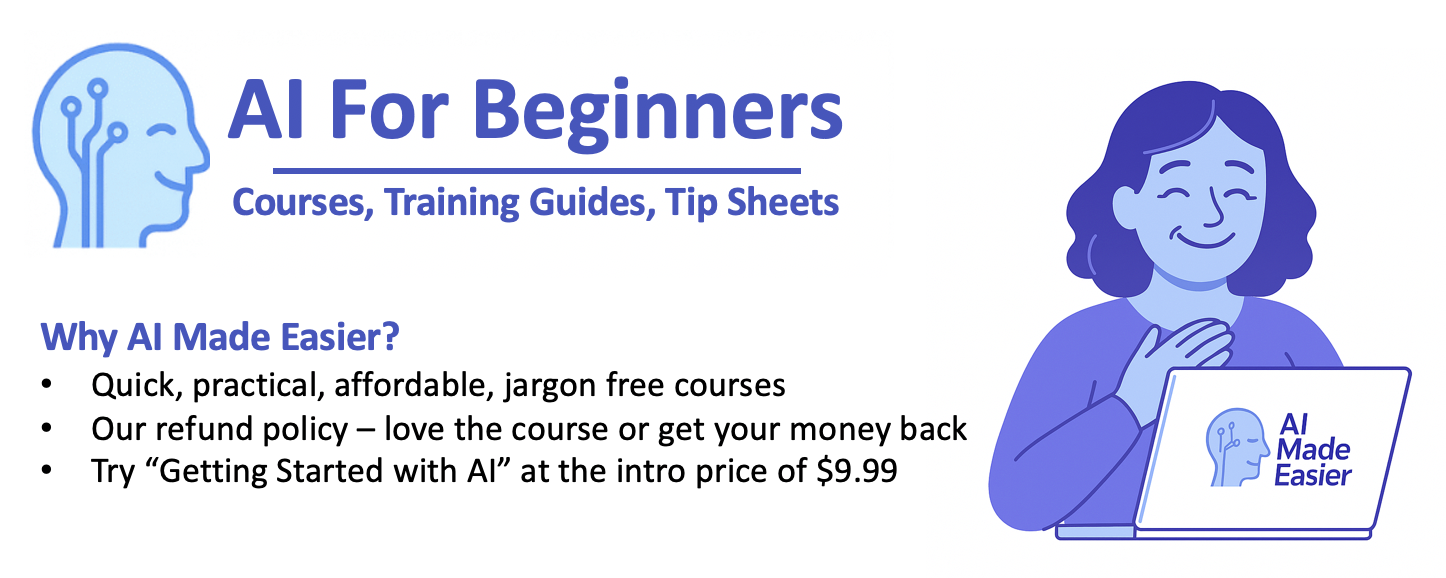What is AI?

What Is AI? (And Why You’re Already Using It)
In a nutshell: Artificial Intelligence (AI) helps machines “get smarter” the more they do something — kind of like humans, but without the caffeine addiction or Monday morning mood swings.
Where Do We See AI in Real Life?
You don’t need to work in tech or have a computer science degree to use AI. In fact, it’s probably already working quietly in the background of your everyday life — streamlining, suggesting, and making things just a little easier:
- Smart Assistants like Alexa, Siri, or Google Assistant answer questions, set reminders, and even tell you a joke — all without judgment.
- Photo Apps that auto-magically recognize faces or clean up red-eye, because your cousin always blinks.
- Email Filters that know spam when they see it, saving you from “exclusive crypto deals” and mystery prince inheritances.
- Streaming Services like Netflix or Spotify that know your guilty pleasure for cozy murder mysteries or ’90s hits before you do.
- Online Shopping Platforms that recommend products based on your habits (yes, it remembered you bought fuzzy socks last winter).
- Your Car’s Lane Assist or Bank’s Fraud Alerts — both powered by AI to keep you safer, on the road and online.
How Does AI Actually Work?
Let’s break it down. Under the hood, most AI systems are built with a few key ingredients:
- Data – The more, the better. Like a kid learning to read, AI improves as it consumes more examples.
- Algorithms – These are step-by-step instructions for solving a task, like a recipe. Only instead of baking cookies, AI is learning to detect fraud or write emails.
- Learning Models – These are the “brains” behind AI. They take data and learn patterns, improving over time — kind of like your sourdough starter, if it went to grad school.
Two of the most common types of AI:
- Machine Learning (ML) – Instead of telling the computer how to do something, you show it enough examples, and it figures out the pattern on its own.
- Natural Language Processing (NLP) – This lets machines understand human language — written, spoken, and yes, even mumbled voice-to-text messages.
So when you type “best shoes for flat feet” into Google or ask your smart speaker to “play something chill,” AI is translating that into meaningful action.
Is AI Replacing Humans?
The short answer? No.
The more accurate answer? Not even close.
AI is really good at a few specific things: doing repetitive tasks, analyzing huge amounts of data quickly, and handling the boring stuff most of us would rather avoid.
But it can’t replace human creativity, emotional intelligence, or decision-making. Think of AI as your virtual assistant — helping you work faster, smarter, and with fewer mistakes.
(If you’re Batman, AI is Robin. If you’re a business owner, AI is your unpaid-but-very-helpful intern. If you’re a parent, AI is the patient tutor your kid actually listens to.)
Why This Actually Matters — For Everyone
AI isn’t just a “tech trend.” It’s becoming essential in how we work, live, and connect. Here’s how different people are using it today:
- Parents: Using AI tools to help with homework, organize schedules, or write permission slip reminders in under 30 seconds.
- Teachers: Creating interactive lesson plans, grading assignments faster, and finding engaging content to support diverse learners.
- Small Business Owners: Automating customer support, writing social posts, or analyzing sales data without needing a data analyst.
- Seniors: Asking Alexa to play Sinatra, set medication reminders, or even control smart home features with just their voice.
Bottom line: AI isn’t about replacing people — it’s about empowering them.
So, What’s Next?
We’re just scratching the surface. In upcoming blog posts, we’ll explore:
- ✅ The best beginner-friendly AI tools
- ✅ How AI can help you at home and at work
- ✅ Common AI myths — and what’s actually true
Our goal is simple: to help you use AI to make your life easier, not more complicated.
Ready to Get Started?
- 🔹 Sign up for our free AI Newsletter — get bite-sized updates, tools, and how-to guides
- 🔹 Explore our blog — we make AI easier, one post at a time
- 🔹 Or just ask your smart assistant to remind you to check back in tomorrow 😄
